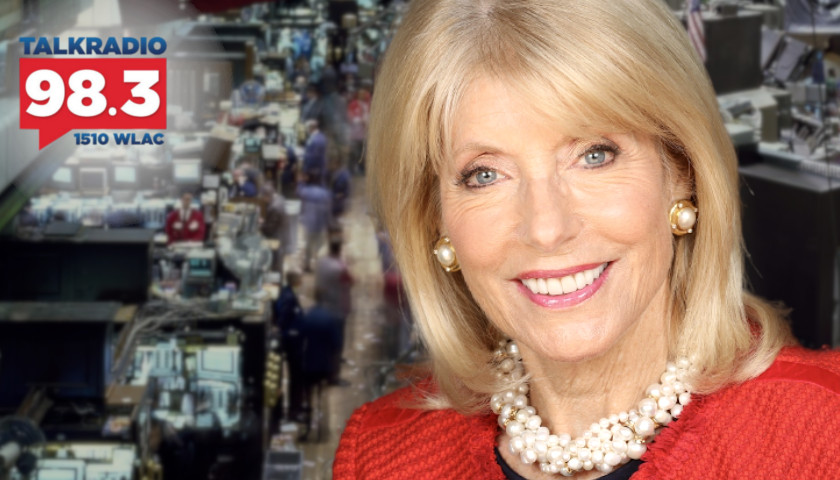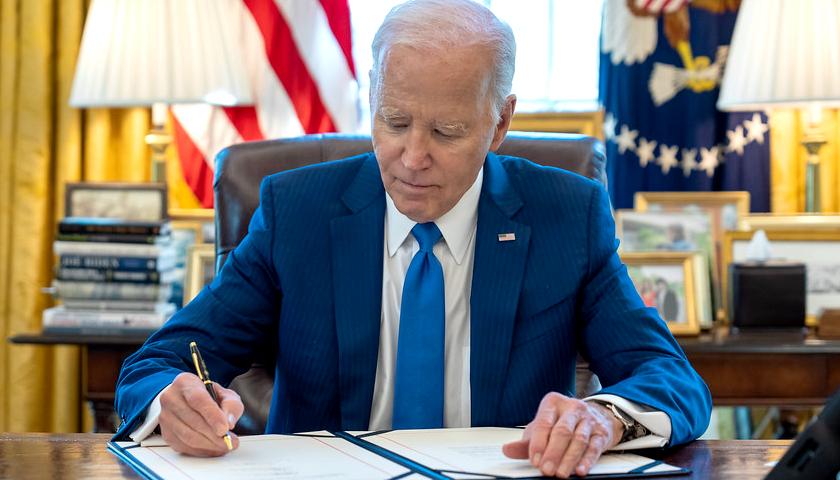Live from Music Row Thursday morning on The Tennessee Star Report with Michael Patrick Leahy – broadcast on Nashville’s Talk Radio 98.3 and 1510 WLAC weekdays from 5:00 a.m. to 8:00 a.m. – host Leahy welcomed by Fox Business contributor and Wall Street expert Liz Peek on the newsmaker line to talk about stock market trends, the Fed, and rising inflation.
Leahy: We are joined on the newsmaker line by our very good friend − somebody that needs to help me understand what’s going on in the stock market right now − Liz Peek, the Fox News contributor, an expert on the stock market. Liz! Thanks for joining us.
Peek: Good morning. I’m so delighted to be with you. Thank you.
Leahy: I need some help, Liz. (Peek chuckles) I need some help. I was looking at that 401(k) and I looked at the report from January. Holy cow!
Simon: I turned it to a 401(j).
Leahy: That’s Roger Simon, our co-host this morning. The S and P were down 5.3 percent in January. Oh, my goodness! Is this just like a one-time cyclical thing, or what should I do, Liz?
Peek: First of all, it is pretty normal to have corrections in the stock market of 5 percent or more. We have been blessedly free of those over the last couple of years. But that is unusual for people who want to lose their lunch because the stock market trades down a bit.
You need to get out of the stock market, because you’re just not ready to deal with the reality. I’m kidding. But it is true that generally speaking, historically, there have been 5 percent corrections several times a year, often. So this is nothing new.
But I think, look, there’s a big change taking place. Earnings drive the stock market. There’s no question about that. So far, the earnings season has been pretty good. Not spectacular, but pretty good.
And that’s why the stock market is coming back some in recent trading days. But we’ve had a huge pivot by the Federal Reserve. And that’s what obviously all the volatility is all about.
The new game in town is trying to guess whether the Fed will raise rates two times, four times, six times this year by 50 basis points, 25 basis points. Why? Because the Fed is sort of the last bastion against letting inflation go unchecked.
And inflation is now over seven percent. We are going to see it in print today, and it’ll probably be about seven and a half percent in terms of CPI, the consumer price index. Everyone knows prices are going up.
When you go to the grocery store and you buy chicken or you buy steak or heaven forbid, avocados, you see increases in prices. Rents are going up. Energy is obviously way up year over year. So my contention over the last year has been that the Fed is way behind the eight-ball on this.
The Federal Reserve has overseen a money supply increase of about 30 percent, I believe, over the last two years. By the way, other countries are in similar situations, but ours has been even more aggressive.
And on top of that, we’ve had huge fiscal stimulus, which is just a way of saying that the government has spewed out trillions of dollars to people who have received checks in the mail and gone and spent them.
It’s actually unprecedented. That’s a word that really does have meaning, that we have never engaged in an experiment like this before, where we have ramped up the Fed’s balance sheet so aggressively and at the same time poured lots and lots of money into relief programs of one sort or another.
At the same time, we have what has emerged as a critical labor shortage. And so because we don’t have enough workers, there are not enough goods on the shelves, too much money chasing too few goods.
And really, right now, investors really need to be watching the inflation numbers incredibly carefully because that will determine Fed policy and to some degree, that will determine stocks.
Leahy: The Epoch Times Senior Editor at Large Roger Simon is in-studio with us. Roger has a question for you, Liz.
Simon: I’m going to ask you the apocalyptic question. Are we in danger of turning into the Weimar Republic here and having a real decline in the value of the dollar?
Peek: I don’t think so, because I think the Fed has finally awakened to the problem that exists. The reason it didn’t happen earlier … in my view, the Fed must have known this was coming because there were all kinds of facts going into 2021 that really should have prevented another $2 trillion, which is what the American Rescue Plan was, more or less, of being passed.
Consumers had, some say $2 to $3 trillion of excess savings. We had all the stimuli out there. And again, we had a worker shortage. So there’s no question in my mind. And by the way, housing prices were way up, which translates into rent. Rents are a big factor in inflation, et cetera.
So the answer is, now the Fed is on it. We know from history, although actually the history − we’ve really had one episode in my lifetime of rampant inflation, and that’s when Paul Volcker stepped in, and all of a sudden we had 20 percent interest rates. But he did do that.
And I think that will happen again if the numbers just continue to get worse. I think they will continue to get worse in the near term. The administration and the Fed continue to see an easing of the problems that led to this incredibly high inflation rate.
I hope they’re right. But right now we really haven’t seen any increase in people coming back to work. There was a slight bump up in that figure in the latest jobs report, but it turned out to be a function of adjusting the numbers, which always makes me squeamish.
So I think we have a problem. And I think it isn’t going to go away anytime soon. But we’re not going to get to the point where we’re lighting cigars with Deutsche Marks.
Leahy: (Chuckles) Liz, over the course of the next 10 months or so, 11 months till the end of the year, how many times and at what level will the Fed raise the interest rate to?
Peek: I think it’s a good question. I’d like to see them do 50 basis points at the March meeting. I don’t think they will. I think that Jay Powell’s entire premise is that the less you jolt the market, the better to some degree, the more you jolt the market, and when it comes to stifling inflation, the better, in my view. But my guess is we’re talking a 25 basis point hike in March and then probably four more. I mean, that’s a guess. I have no insight, obviously, into what Jay Powell is thinking. I do think two things are interesting politically.
One is that Democrats now, I wrote a piece several weeks, maybe a couple of months ago at The Hill about how Democrats will throw Jay Powell under the bus. They don’t want to be tarnished with having spent too much money and driven inflation higher.
So it’s better just to blame the Fed. And now you’re beginning to see that. The Washington Post had a very critical article out. I mean, they weren’t critical, but they mention all kinds of critical people saying, oh, Jay Powell should have seen this coming. That will be their default excuse. And I think Jay Powell is going to be under enormous pressure to turn that around.
Simon: Do you think the public is going to believe that excuse?
Peek: I think when you’ve got the entire legacy media on your side and Congress berating Jay Powell, yes, I think a lot of people will be convinced that, oh, my goodness, Democrats didn’t do anything wrong.
And really, we do need to, after all, think about Joe Biden telling the American people that Build Back Better, another probably $3 to $5 trillion bill, if scored accurately, was going to bring down inflation. (Laughter)
Leahy: It’s laughable.
Peek: It is.
Leahy: By the way, Liz, we call it Build Back Broker.
Peek: Yes. I mean, it’s a preposterous notion. Truly, it’s a preposterous notion.
Simon: Well, they’re not going to convince the Canadian truckers.
Peek: (Chuckles) No, the truckers are out there. And I’ve got to say, I’m kind of happy that we had this uprising of real people saying, enough. Enough of the mandates, enough of the stupid policies that have no bearing in science.
You are not science, Anthony Fauci. You are a very poor replica and vessel of telling us what you think is science. And that very poor vessel has determined an awful lot of measures that have really made people miserable, and has basically been wrong.
Simon: You’re preaching to the choir here.
– – –
Tune in weekdays from 5:00 – 8:00 a.m. to The Tennessee Star Report with Michael Patrick Leahy on Talk Radio 98.3 FM WLAC 1510. Listen online at iHeart Radio.
Photo “Liz Peek” by Liz Peek.








